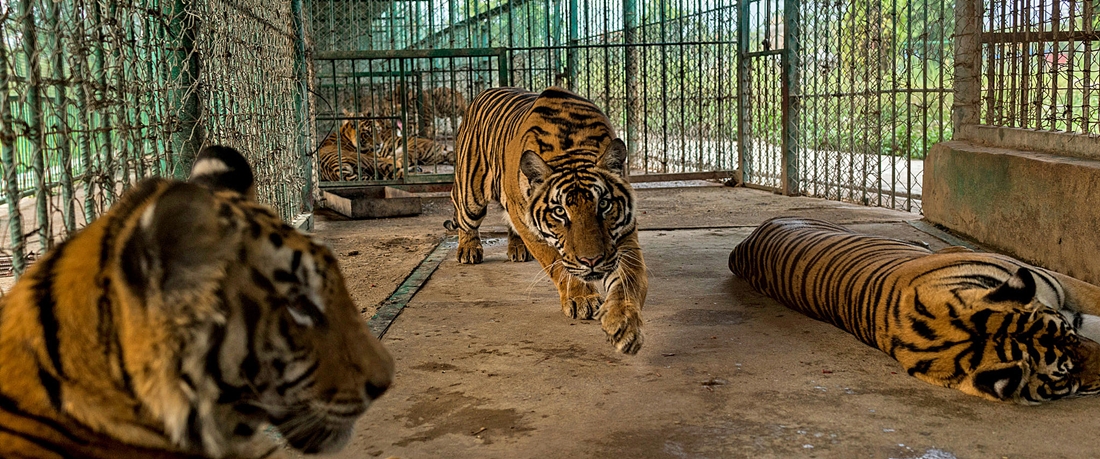With as few as 3,000 remaining in the wild, tigers remain alarmingly vulnerable to extinction. The primary threat faced by wild tigers is of being poached for trade in their skins, bones and other body parts. To ensure a long-term future for tigers in the wild, the demand for all tiger parts and products, whether sourced from wild or captive tigers, needs to be ended.
The Environmental Investigation Agency (EIA) is committed to investigating and exposing environmental crime. Since 1984, EIA has pioneered the use of specialised techniques such as covert investigations to gain factual evidence of environmental crime, spanning the areas of wildlife trafficking, illegal logging, climate change and disposal of hazardous waste.
In 2012 and 2013, a team of EIA investigators travelled to China to investigate trade in parts and products sourced from tigers. The EIA team uncovered a legal trade in skins sourced from captive tigers in China and obtained hard-hitting evidence of an active marketplace, promoted for luxury home décor.
China has more than 5,000 tigers in captivity in tiger ‘farms’ and other commercial enterprises. Shruti Suresh, Wildlife Campaigner at EIA, said, “Allowing any trade in parts and products serves only to stimulate consumer demand, creating a massive enforcement challenge and undermining the efforts of the international community to protect tigers.”
EIA’s findings were published in a powerful report, Hidden in Plain Sight: China’s Clandestine Tiger Trade, calling on China to adopt a complete ban on all trade in tiger parts.
As a small non-governmental organisation with limited resources, EIA was able to benefit from iProbono’s network of lawyers and law students which shared its concerns. iProbono was able to support EIA’s efforts by:
- Connecting it to law students in China who had the appropriate language skills to translate legal documents such as laws, regulations and notices from Mandarin to English, which was instrumental in the investigation into the trade in skins sourced from captive tigers.
- Engaging environmental lawyers and academics from the US who were able to reach out to counterparts based in China to provide additional information on domestic wildlife laws and policies.
- Sourcing law students from around the world to conduct legal research and analysis on the penalties applicable for wildlife crime in countries such as the Democratic Republic of Congo, India, Kenya, Singapore and the UK.
Shruti focuses on effective criminal justice responses to environmental crime at EIA. Starting her legal career in India after graduating from the National University of Juridical Sciences in Kolkata, Shruti went on to do her postgraduate studies at Columbia University in New York and, later, to work with the public interest law firm in Washington DC, Meyer Glitzenstein and Crystal, renowned for pioneering key litigation for the protection of wildlife.
Joining EIA in 2012, Shruti said, “Working with a dedicated and courageous EIA team makes me recognise the power of organisations as small and dynamic as EIA to challenge vested interests for the protection of our environment and wildlife.”
In respect of its work on combating wildlife trade, she added, “We hope that with additional research over the year, we will be able to obtain a better global picture of whether wildlife laws are geared to effectively tackle wildlife crime.”
How can you get involved?
If you would like to take action to end tiger farming, EIA advises:
- Be aware of and share the concerns related to tiger farming. More information on this is available in Caged Assets: Tiger Farming and Trade, a report jointly prepared by EIA and several other NGOs.
- When on holiday, avoid the temptation to give tiger ‘farms’ your money to pose and play with captive tigers.
- Urge your government to actively call for an end to all trade in parts and products from wild or captive tigers.
- If you are a lawyer or a law student from China, Thailand, Vietnam or Lao PDR and would like to help on the issue of tiger farming, contact us as EIA requires legal research in these jurisdictions.







